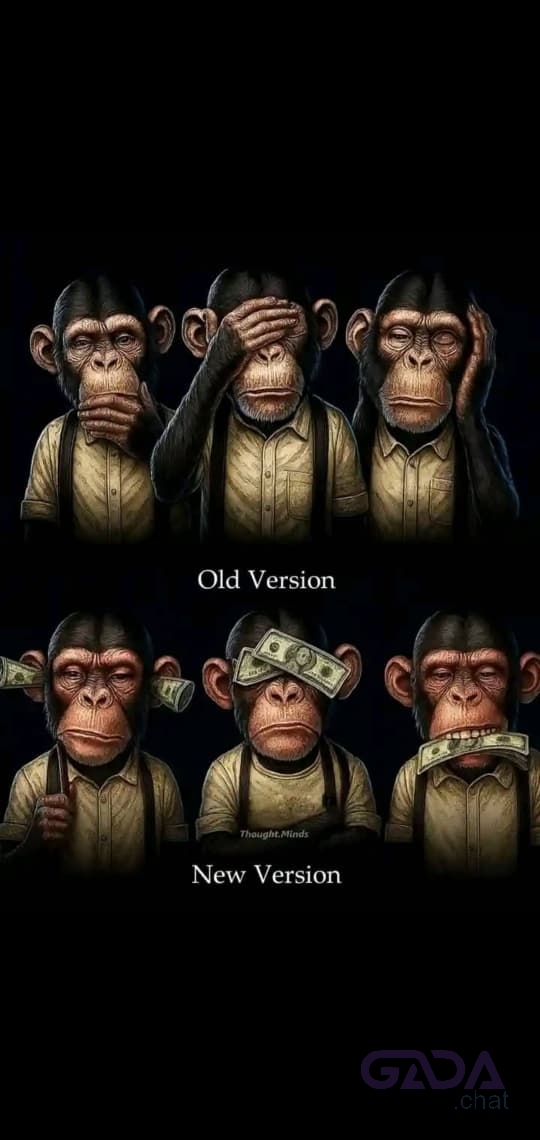THE BETRAYAL
© Grace O.O
Part 5
Two days later, Serena travelled back home. On arrival, she didn't meet Linda at home. But she found a note on the table.
"Dear Serena, I was feeling lonely so I decided to go and stay at the house of my fiance. I'll see you later".
Serena hissed angrily and threw away the note. " If she likes, she can stay there forever".
She took in her bags and went to shower after which she sat down to devour the akara and pap that she purchased on her way. She had just finished eating when her phone rang. It was Titi, one of her colleagues at work.
"Hello Titi. Good morning".
"Ha, Serena! Where are you at the moment?". Titi asked agitatedly, ignoring the greetings.
"Chill, I'm at home. I just arrived from the official trip. Is anything the problem?".
"Wait, did your friend tell you she was getting married?". Titi asked.
"Yes, she mentioned that she would be getting married in a month time. Infact, she's pregnant". Serena replied, wondering where the conversation was leading to.
"Oh my God! Linda is a traitor. You know what, just dress up and meet me at the High Court ASAP!!". Titi said with urgency in her voice. Serena got perplexed.
"What's going on?". She wondered as she quickly dressed up and rushed out of the house. When she arrived at the High Court, she saw Titi standing outside, her hands on her hips. She walked towards her.
"Titi, what's happening?".
"Serena, I need you to calm down. Let's go into the premises and wait". Titi said and pulled her inside the court's premises. Serena could see some cars parked and decorated for a wedding. One of the cars caught her attention.
"Wait a minute, this car looks like Tony's. Or am I seeing things? Maybe it's just a lookalike". She thought.
After waiting for a while, she saw some people walk out of the court. From where she stood, she could see Linda dressed in a wedding gown.
"Oh my God!". She gasped. So Linda could do this, she thought. Then she look at the groom closely. At first, she thought that her eyes were playing trick on her.
"Wait, is that Tony?". She asked in a whisper. Titi held her and shook her head sadly. Serena shook her off and stormed towards the duo in fury.
"What is going on here?".
Tony and Linda were shocked to see her. They didn't expect her to be there since she had travelled.
"Serena, I can explain". Tony started.
"Oh really, I'm all ears. Tell me your story". Serena replied sardonically.
"I didn't mean to hurt you but she seduced me. She got me drunk and forced herself on me". Tony revealed.
"Are you mad?! Why are you lying against me? Weren't you the one who forced yourself on me that night when you came over to our place?". Linda countered.
"I can't believe this! Linda, how could you do this to me? You seduced my man, got pregnant for him and married him. I trusted you so much not knowing that you're a devil's incarnate. Who knows? You could have poisoned me too". Serena was still speaking when Linda cut her off.
"Hey Serena, watch your words! Don't you dare accuse me of what I didn't do. Tony's moved on, why don't you do the same and get out of here!".
"I will, honey. But know one thing, you're going to regret this. I promise you". She turned to Tony.
"You said you loved me, why didn't you tell me what happened? Why? Tony, I loved you with my whole life. I shared everything I had with you but you decided to cheat on me, with my friend. You know, I used to wonder how Jesus felt when Judas Iscariot betrayed him. I think I know how it feels now to be betrayed by the people you loved". She laughed and left.
"Serena, I'm sorry. Please". Tony ran after her and caught up with her. Titi eyed Linda who stared back defiantly. She didn't even show any sign of remorse.
"You're such a stinky slut!". Titi told her.
"Hey, hold it there! I don't recollect coming near your man". Linda fired.
"Look at this snake! You're not even ashamed of yourself. Ashawo!". Titi cursed and left to find Serena. She found Tony running after Serena and ran after him. She stopped a distance away from the duo and watched them.
"Don't touch me! Don't even come close to me!". She screamed at him but he didn't listen. He pulled her into an embrace and allowed her to cry in his arms while enduring her punches and bitings.
"I'm sorry for hurting you Serena. I really didn't want to. I loved you Serena, I really did".
"I don't want to hear it again!".
"You know what, I wish you a happy married life. Go back to your wife and unborn child, thank you so much". She said and pushed him off. She looked around and saw Titi watching them.
"Titi, let's leave this place".
Titi came over to meet her and pulled her into an embrace while patting her back gently. Serena watched Tony's retreating figure and burst into a torrent of tears when he was out of sight.
"It's alright Serena. You will find a good man who will love you and stay faithful to you". Titi said, trying to console her.
_______________
To be continued...
Dear Serena, take heart. Life is full of so much evil.
Do you think that Titi did the right thing? Please drop your opinions in the comments section.
#_pen_of_graceTHE BETRAYAL
© Grace O.O
Part 5
Two days later, Serena travelled back home. On arrival, she didn't meet Linda at home. But she found a note on the table.
"Dear Serena, I was feeling lonely so I decided to go and stay at the house of my fiance. I'll see you later".
Serena hissed angrily and threw away the note. " If she likes, she can stay there forever".
She took in her bags and went to shower after which she sat down to devour the akara and pap that she purchased on her way. She had just finished eating when her phone rang. It was Titi, one of her colleagues at work.
"Hello Titi. Good morning".
"Ha, Serena! Where are you at the moment?". Titi asked agitatedly, ignoring the greetings.
"Chill, I'm at home. I just arrived from the official trip. Is anything the problem?".
"Wait, did your friend tell you she was getting married?". Titi asked.
"Yes, she mentioned that she would be getting married in a month time. Infact, she's pregnant". Serena replied, wondering where the conversation was leading to.
"Oh my God! Linda is a traitor. You know what, just dress up and meet me at the High Court ASAP!!". Titi said with urgency in her voice. Serena got perplexed.
"What's going on?". She wondered as she quickly dressed up and rushed out of the house. When she arrived at the High Court, she saw Titi standing outside, her hands on her hips. She walked towards her.
"Titi, what's happening?".
"Serena, I need you to calm down. Let's go into the premises and wait". Titi said and pulled her inside the court's premises. Serena could see some cars parked and decorated for a wedding. One of the cars caught her attention.
"Wait a minute, this car looks like Tony's. Or am I seeing things? Maybe it's just a lookalike". She thought.
After waiting for a while, she saw some people walk out of the court. From where she stood, she could see Linda dressed in a wedding gown.
"Oh my God!". She gasped. So Linda could do this, she thought. Then she look at the groom closely. At first, she thought that her eyes were playing trick on her.
"Wait, is that Tony?". She asked in a whisper. Titi held her and shook her head sadly. Serena shook her off and stormed towards the duo in fury.
"What is going on here?".
Tony and Linda were shocked to see her. They didn't expect her to be there since she had travelled.
"Serena, I can explain". Tony started.
"Oh really, I'm all ears. Tell me your story". Serena replied sardonically.
"I didn't mean to hurt you but she seduced me. She got me drunk and forced herself on me". Tony revealed.
"Are you mad?! Why are you lying against me? Weren't you the one who forced yourself on me that night when you came over to our place?". Linda countered.
"I can't believe this! Linda, how could you do this to me? You seduced my man, got pregnant for him and married him. I trusted you so much not knowing that you're a devil's incarnate. Who knows? You could have poisoned me too". Serena was still speaking when Linda cut her off.
"Hey Serena, watch your words! Don't you dare accuse me of what I didn't do. Tony's moved on, why don't you do the same and get out of here!".
"I will, honey. But know one thing, you're going to regret this. I promise you". She turned to Tony.
"You said you loved me, why didn't you tell me what happened? Why? Tony, I loved you with my whole life. I shared everything I had with you but you decided to cheat on me, with my friend. You know, I used to wonder how Jesus felt when Judas Iscariot betrayed him. I think I know how it feels now to be betrayed by the people you loved". She laughed and left.
"Serena, I'm sorry. Please". Tony ran after her and caught up with her. Titi eyed Linda who stared back defiantly. She didn't even show any sign of remorse.
"You're such a stinky slut!". Titi told her.
"Hey, hold it there! I don't recollect coming near your man". Linda fired.
"Look at this snake! You're not even ashamed of yourself. Ashawo!". Titi cursed and left to find Serena. She found Tony running after Serena and ran after him. She stopped a distance away from the duo and watched them.
"Don't touch me! Don't even come close to me!". She screamed at him but he didn't listen. He pulled her into an embrace and allowed her to cry in his arms while enduring her punches and bitings.
"I'm sorry for hurting you Serena. I really didn't want to. I loved you Serena, I really did".
"I don't want to hear it again!".
"You know what, I wish you a happy married life. Go back to your wife and unborn child, thank you so much". She said and pushed him off. She looked around and saw Titi watching them.
"Titi, let's leave this place".
Titi came over to meet her and pulled her into an embrace while patting her back gently. Serena watched Tony's retreating figure and burst into a torrent of tears when he was out of sight.
"It's alright Serena. You will find a good man who will love you and stay faithful to you". Titi said, trying to console her.
_______________
To be continued...
Dear Serena, take heart. Life is full of so much evil.
Do you think that Titi did the right thing? Please drop your opinions in the comments section.
#_pen_of_grace









